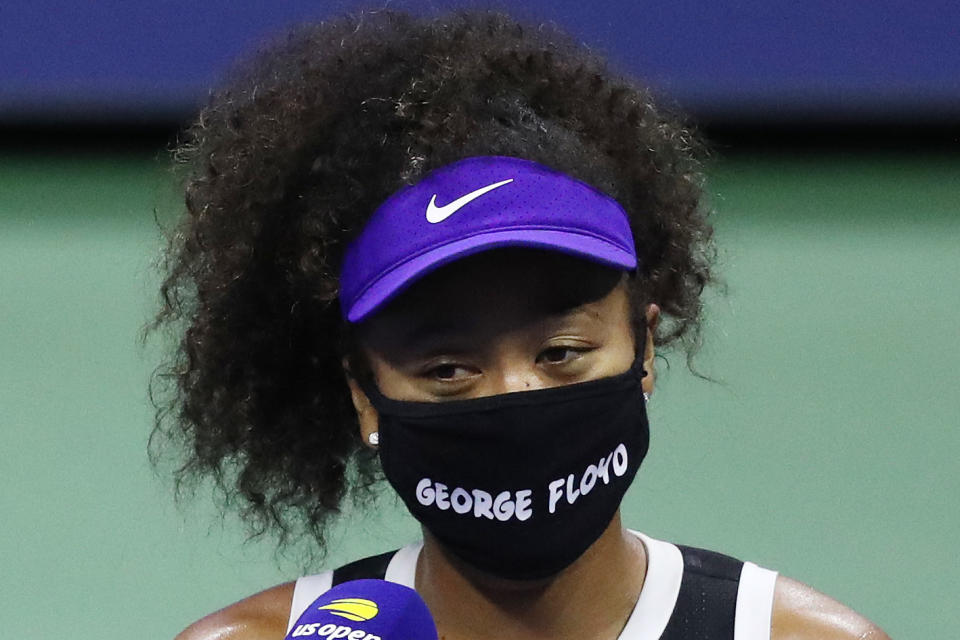Naomi Osaka won in two amazing ways: Athleticism and activism
Naomi Osaka’s brief Twitter bio reads “how to be unprofessional 101.”
It’s certainly a dig at herself. Scroll back on her timeline several months and you can see Osaka responding to random haters, such as a woman who tweeted “Boooooooooooo” in January when the Australian Open posted that Osaka was opening her defense of the Grand Slam title — “u big mad or little mad Dianne?” Osaka wrote.
Based on the last few months though, she might need to change that bio. Osaka is showing what it means to blend being a professional athlete and activist, and that one can be the latter without negatively impacting the former.
It could even be argued that athletic success increases the impact of one’s activism.
As you’ve likely seen by now, Osaka packed seven masks for the US Open fortnight, one for each match she’d play if she made it to the final. She made the final. She won her second Open in three years.
Because of that, viewers were reminded anew of the seven Black Americans she remembered, five killed police and the sixth and seventh, Trayvon Martin and Ahmaud Arbery, killed allegedly by civilians for being Black in neighborhoods where vigilantes thought they didn’t belong.
They’re all well-known names at this point: In order, Osaka honored Breonna Taylor, Elijah McClain, Arbery, Martin, George Floyd, Philando Castile and Tamir Rice. Heartbreakingly, no one has faced any real consequences for their deaths.
As Osaka did the customary post-match interview with ESPN, she was asked what message she was trying to send with the masks.
“What’s the message you got, was more the question,” she said. “I feel like the point is to make people start talking.”
It was another winner from the three-time Grand Slam champ.
What was the message you got?

Osaka is by nature quiet and shy, though she’s working past the shy part: In May, she declared on social media that she’s “done” with it because it’s a waste of her time and limiting, recalling a meeting with rap mogul Jay-Z when he tried to engage her and she wasn’t able to give more than one-word answers, ending the conversation.
It was after watching the horrifying video of Minneapolis officer Derek Chauvin casually kneeling on Floyd’s neck, his hand in his pocket as Floyd pleaded for his life, that Osaka said she was moved to action.
She wrote in Esquire magazine that she and her boyfriend, rapper Cordae, flew to Minneapolis to take part in peaceful protests, and after returning home to Los Angeles she signed petitions and donated but felt it wasn’t enough.
Last month, on the extraordinary day that NBA players decided they would not play, Osaka followed suit and announced she wouldn’t play the next day in the Western & Southern Open semifinals. It initially was meant as a protest, with Osaka prepared to cede the match, but instead the tournament pushed its schedule back a day. She arrived at the court wearing a Black Lives Matter T-shirt, the words wrapped around a raised fist.
A global marketing dream — a young woman born of Japanese and Haitian parents who has lived in the United States for most of her life — Osaka became the highest-earning female athlete in history in 2019, pulling in over $37 million through tournament purses and endorsements.
But any company that wants to partner with Osaka, a roster that includes Nike, Mastercard, Nissan and beauty brand Shiseido, knows that she’s not going to be quiet, not about racism and police violence.
“I hate when random people say athletes shouldn’t get involved with politics and just entertain,” she tweeted in June. “Firstly, this is a human rights issue. Secondly, what gives you more right to speak than me? By that logic if you work at IKEA are you only allowed to talk about the ‘GRÖNLID’ [sofa]?”
She’s leaning into it all, in a way that belies her bashful disposition, in a sport that struggled (to put it kindly) to embrace Venus and Serena Williams when they dared rise from Compton to the hallowed grounds of the All England Club, their brown skin shining under their tennis whites, their beaded braids swinging along with their forehands.
Serena in particular has been a fierce voice for women and for Black people even as tennis, particularly media in other parts of the world, have portrayed her in ways that range from light to full-on racist (remember this?), and it’s only as she’s gotten older and racked up 23 singles Grand Slam crowns that she’s become the doyenne of the game.
Here is Osaka on the path they forged, commanding the sport’s respect with her play and with her unapologetic stance on something that can’t be fought without full-throated opposition. If she’s lost a chance at sponsors, if it’s been suggested that perhaps she tone it down, she’s not listening.
Her face masks in Flushing offered Osaka the opportunity to speak volumes.
Her play offered her the chance to keep pushing the conversation along.
What is the message you’re getting?
More NFL from Yahoo Sports:


